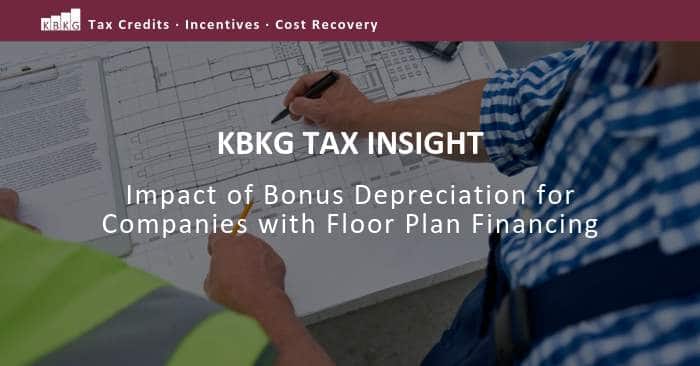As a follow up to the KBKG Tax Insight article, Impact of Final Regulations and New Proposed Regulations for Additional First Year Depreciation Deduction, released last week providing a summary of the new final proposed regulations for additional first year depreciation deduction, we now dive deeper into the impact of floor plan financing indebtedness upon the additional first year depreciation deduction.
KBKG Insight: On September 13, 2019, the IRS and Treasury Department released final regulations that provide guidance regarding bonus depreciation deductions under section 168(k) the tax code (REG-104397-18). The final regulations adopt the proposed regulations (from August 2018) with some modifications. They address operational rules including how to compute bonus depreciation, how to make certain elections under IRC Sec 168(k), and qualifications for bonus depreciation availability.
Concurrently, the IRS and Treasury Department released additional proposed regulations (REG-106808-19) providing more guidance on issues not previously addressed (with an October 23, 2019 deadline to submit commentary).
Floor Plan Financing Provision:
The final regulations maintain that property is not qualified if primarily used in a trade or business depicted in IRC Section 163(j)(7)(A)(iv). The same consistency applies towards property used in a trade or business that has had floor plan financing indebtedness and its related interest is “taken into account” for such tax year, under section 163(j)(1). This bonus depreciation exclusion affects property placed into service in any tax year after December 31, 2017.
Commentary was requested to clarify when the floor plan financing interest is “taken into account,” the length of time the section applies, and eligibility to claim bonus depreciation on leased property to a trade or business described in IRC Section 168(k)(9).
In response to the phrase for “taken into account,” clarification was provided to explain that a trade or business is not eligible for bonus deductions if they benefited from floor plan financing interest within IRC Section 163(j)(1)(C). Under the proposed regulations, such interest is “taken into account” and benefits a trade or business if their total business interest expense, which includes floor plan financing interest, exceeds 30% of adjusted taxable income plus business interest income.
The length of time that the floor plan financing indebtedness applies is for each individual tax year where the trade or business received benefit from the floor plan financing interest. This means that floor plan financing indebtedness needs to be calculated annually for each tax year after December 31, 2017. For instance, if a dealership benefitted from floor plan financing indebtedness in the 2018 tax year, it would exclude them from bonus depreciation eligibility for property placed into service for the tax year but would not automatically exempt them from being eligible for bonus depreciation on property placed in service in subsequent years.
The new Proposed Bonus Regulations provide additional guidance regarding leased property used by a business described in IRC Section 168(k)(9), which would generally be ineligible for bonus depreciation if owned by said business. The owner (lessor) of the leased property would be eligible for bonus depreciation as long as their trade or business is not specifically defined in such section and provided that all other requirements are met. The final regulations hold that taxpayers that operate businesses as defined in IRC Section 163(j)(7)(A)(iv), for example certain farming and utility-service businesses, are still excluded from bonus depreciation.
KBKG Insight: Businesses within the retail automotive industry would benefit most from this clarification!
A tax planning opportunity occurs for a real estate holding company to purchase industry-specific property and lease to the operating entity.
Example A –
An automobile dealership company decides it is time to expand and build a new location. The automobile dealership operating company benefits from floor plan financing, so bonus depreciation will not apply to assets placed into service by the company in 2019. Through some tax planning, the automobile dealership decides the new construction location will be owned by a new real estate holding company. This planning opportunity paired with cost segregation services allows the taxpayer to maximize the first-year depreciation deductions by allowing bonus depreciation to be available to property with less than a 20 year depreciable life.
Example B –
Building LLC, not described as a business under section 168(k)(9)(B), purchases five automotive lifts for the dealership service bay area for a total of $15,000 and placed them into service on June 1, 2018. In turn, Operating LLC (which benefits from floor plan financing) leases the five lifts for their business under an operating lease agreement. Building LLC is eligible to apply 100% bonus depreciation for the five lifts in the 2018 tax year as they are 1245 personal property with a recovery period less than 20 years.
There was quite a bit of uncertainty as to whether automobile dealerships could benefit from the accelerated first year deprecation provisions outlined in the TCJA and with these regulations, we now have clarity.
Appropriate structuring coupled with cost segregation can afford tremendous tax savings opportunities.
To find out more on how the Final Additional First Year Depreciation Deduction rules impact you and your clients, please contact us.
Authors: Lester Cook, CCSP & Sasha Brenecki
Download Tax Insight: Impact of Bonus Depreciation for Companies with Floor Plan Financing


